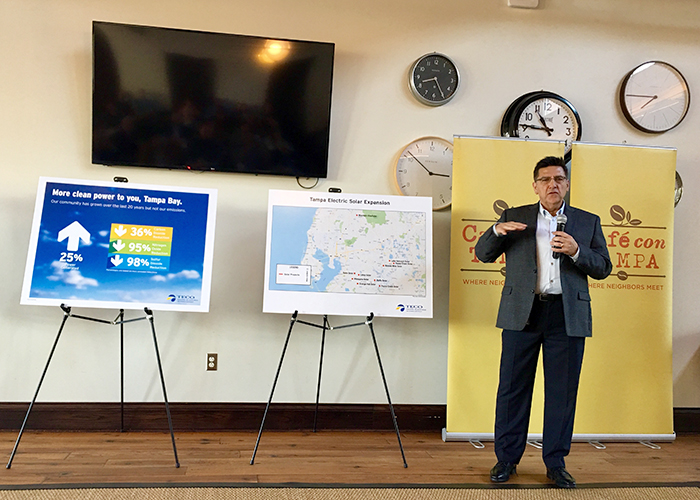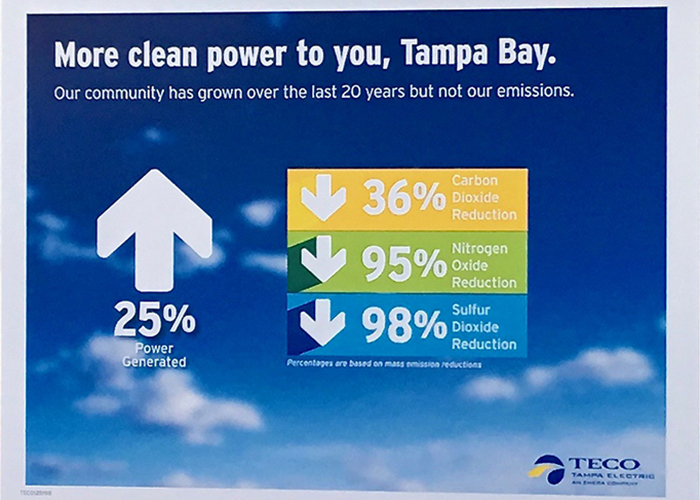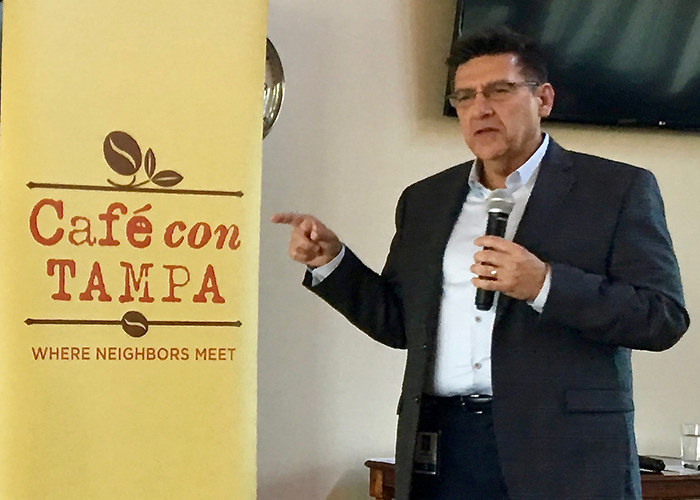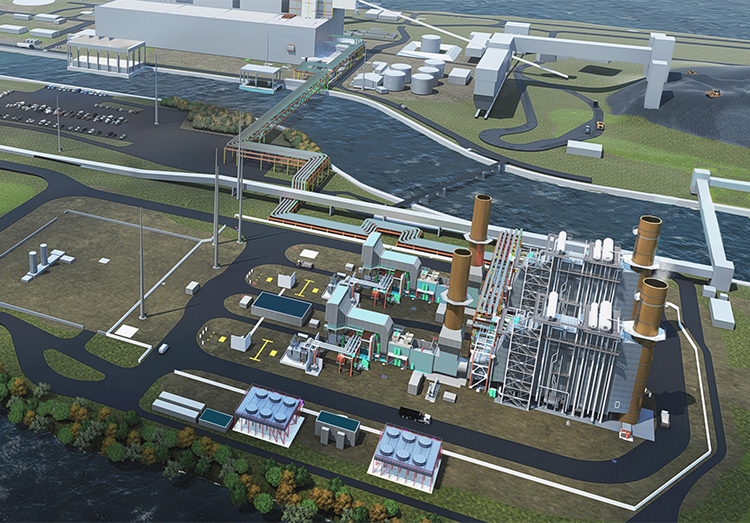Florida’s growth challenges state’s energy future
A massive parade of new residents, businesses, and jobs is moving to Tampa and St. Petersburg, Florida's most talked about re-invented, revitalized cities. The challenge for the state’s utilities, including Tampa Electric Co. and Duke Energy, is finding the right mix of safe, reliable and affordable energy sources to support projected growth.
Florida’s population and economy are surging and so is the Sunshine State’s thirst for energy.
Currently, ranked as the third most populous state in the nation at 21 million residents, Florida is projected to add another 6 million residents by 2030. Nearly 1.7 million people are predicted to move to Hillsborough County, with almost 939,000 preferring Pinellas County.
A parade of new residents is marching to Tampa and St. Petersburg, where millennials and down-sizing baby boomers are moving into re-invented, revitalized cities. New businesses and new jobs are keeping pace with the residential spurt.
The challenge for the state’s utilities, including Tampa Electric Co., Duke Energy, and Florida Power & Light, is finding the right mix of safe, reliable and affordable energy sources.
TECO looks for solutions
In west-central Florida, TECO Energy serves about 750,000 customers.
The company’s goal is to provide an energy flow that is affordable while also shifting to cleaner and renewable sources, according to Thomas Hernandez, TECO’s senior vice president for the division of distributed energy and renewables. He recently spoke at a Café con Tampa breakfast.
“We’ve got to worry about keeping the lights on,” Hernandez says. “I have to have capacity.”
But, he says, “We are transitioning away from fossil fuels. That’s the balancing act problem. That’s a dilemma. It’s a tough nut to crack.”
That dilemma is sparking passionate battles between utility officials and environmental activists, around climate change policy and fracking, a controversial method of extracting oil and natural gas.
In the Tampa Bay Area, a proposal by TECO to convert a coal burner into a natural gas burner at its Big Bend Power Station in Apollo Beach is under review by state agencies. The national, nonprofit Sierra Club is challenging the project.
According to company officials, the $853-million project would reduce TECO’s carbon footprint and serve as an adjunct to longer-range plans to increase solar, and other renewable energy sources.
However, environmental activists are critical of a proposal that they say doesn’t address the urgency of climate change threats, and swaps one fossil fuel for another. The natural gas delivered to Big Bend could come from out-of-state suppliers that use fracking, which activists say is environmentally destructive.
Fracking is a drilling technique that blasts chemically treated, high-pressure water through the rock to extract oil and natural gas. Wastewater is then injected into deep wells.
A further concern is Big Bend’s vulnerability to rising sea levels and more extreme weather episodes, including more intense hurricanes.
TECO defends its project as a reasonable step toward meeting federal anti-pollution requirements by replacing coal with a cleaner fuel. Engineering plans for Big Bend also would improve sea wall protections, providing greater safety at the site against water intrusions.
10-year plans offer alternatives
In April TECO, as well as Duke and FLP, filed 10-year plans (2019 to 2028) with the Florida Public Service Commission that show decreases in coal and a boost to solar but also a majority reliance on natural gas.
Utilities see natural gas as a “bridge” fuel to more renewable and cleaner energy sources.
Opponents criticize this strategy as market-driven based on the relatively cheap costs of natural gas, at least, for now.
They would like to see more proposals like FPL’s recent announcement of its “30 by 30” plan to install 30 million solar panels by 2030.
TECO’s solar future includes 10 solar projects in the next decade, which would add 6 million solar panels and power about 100,000 homes. By 2023, TECO officials estimate the company will be the state’s largest solar producer, with solar at about 7 percent of its total energy production.
Coal use would drop from about 24 percent to 12 percent of total production.
The coal data is misleading and reflects percentage change, not actual coal usage, according to Kent Bailey, group chairperson of the Sierra Club of Tampa Bay’s executive committee.
According to TECO’s 10-year plan, coal usage drops significantly by 2023. But Bailey notes that the same plan shows coal tonnage levels in 2027 will rise to about the same levels as 2019.
About 100 people packed a public hearing on TECO’s proposal in March. An administrative law judge took testimony from supporters and opponents.
Jessica Harrington, an Odessa resident and former State House candidate, spoke up to say she believes TECO’s project is outdated.
“Thirty, 40, 50 years ago, maybe that (natural gas) would have been a nice transition but it’s too late,” she says. Scientists predict that unless something changes in 12 years there will be a climate change catastrophe. “This is the moon shot of our time,” Harrington says.
Others found TECO’s proposal reasonable, and pragmatic.
Apollo Beach resident Tom Settle believes TECO is helping the environment by eliminating the coal burner.
“Ash comes out of those (coal) stacks every day,” Settle says. “It’s a really toxic hazard. I’m for natural gas as a transition but I don’t think you can do it overnight.”
Bob Rohrlack, President and CEO of the Greater Tampa Chamber of Commerce, filed a letter of support, writing that the project “is a win for the environment and a win for customers.”
The conversion to natural gas would save customers approximately $750 million over the life of the gas-burning unit, he states.
Other representatives of utility and business associations, and local chambers of commerce, also support TECO.
TECO’s greater reliance on solar drew praise from Hillsborough County Commissioner Mariella Smith.
But Smith criticized TECO for setting goals lower than those achieved by other companies under the umbrella of TECO’s Canadian-owned parent company, Emera, Inc.
Emera’s website notes that a Nova Scotia power company provides 28 percent of its energy from solar.
“I would like to challenge TECO. I would like to think that you…would want to be at least the best in their own company. It’s achievable. I’d like to ask our state to do that. I’d like TECO to be the best in the country. Our state should be a leader in the country.”
“We need to use the sunshine in our Sunshine state,” Smith says.
Where neighbors meet
At the Café con Tampa breakfast, Hernandez addressed similar challenges to TECO’s commitment to solar.
“The challenge is finding enough land that’s affordable to minimize costs of connecting to the grid,” he says.
TECO has about 4,200 acres of solar panels but company officials scouted about 115,000 acres before purchasing acreage for its solar farms.
A solar farm began operations at Big Bend in 2017.
A 500-acre site in northeastern Pasco County is one of TECO’s newest proposals for a solar farm. However, the project stirred opposition from some area residents who say the solar panels would destroy the scenic views in a historically rural neighborhood.
There is insufficient space at Apollo Beach for more solar, Hernandez says. He added that there also is the problem of building storage facilities as a backup for days when there is too little sunshine available for capture by the solar panels.
“We’re in the Sunshine State but the problem is the sun doesn’t always shine,” says Hernandez. Technology and storage space to compensate for cloudy conditions come at a high cost that must be factored in, he says.
The source of natural gas also is a dividing point.
At the Café con Tampa breakfast, Hernandez notes that most of TECO’s natural gas supply would be shipped from Gulf states, such as Louisiana and Alabama, that don’t frack. However, he adds, “We can’t guarantee it’s non-fracked gas.”
A recommendation on TECO’s Big Bend proposal is expected from the administrative law judge in July. However, the final decision is up to Gov. Ron DeSantis and his Cabinet. That isn’t expected until August.
Florida lawmakers ended their 2019 session without taking a vote on a bill to ban two methods of hydraulic fracking. House and Senate bills on the matter died in committee.
Supporters of fracking, including the Florida Petroleum Council, say natural gas is a cleaner, cheaper source of fuel than coal, and extraction through fracking has fewer safety issues. Opponents say the practice is environmentally harmful, leading to water contamination, public health risks, and sinkholes.
Anti-fracking supporters had hoped that a push from DeSantis would give their cause a boost. Unlike his predecessor, Gov. Rick Scott, DeSantis announced his opposition to hydraulic fracking soon after taking office.
But environmentalists also wanted a ban on matrix acidizing, often used in conjunction with hydraulic fracking. DeSantis took no position on this matter.
Acid dissolves rather than cracks through rock formations as a means of oil and gas extraction. Environmentalists warn that this technique would put the Floridan aquifer at ever greater risk.
With no resolution on fracking, both sides will continue the battle into the 2020 legislative session and the next election cycle.

















